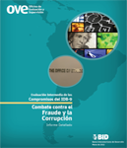IDB-9: Combating Fraud and Corruption
Date
Mar 2013
This report reviews the implementation of the measures the Inter-American Development Bank (IDB or Bank) has taken in the three strategic pillars of the anticorruption agenda: (i) strengthen the prevention of fraud and corruption in Bank operations; (ii) support transparency and anticorruption efforts in the Region; and (iii) ensure high ethical standards for Bank staff. The Bank has taken several actions in the first and third pillars. To help prevent corruption, the IDB has eliminated the overlap of policy and investigations by creating an Anticorruption Policy Committee and giving more independence to the Office of Institutional Integrity, and by establishing a new sanctions structure with greater clarity and stronger accountability. In addition, the 2011 cross-debarment agreement with other multilateral development banks has enhanced the impact of sanctions the IDB may impose. To help ensure internal integrity, the Bank has revised its Code of Ethics and whistleblower policy, improved the enforcement capacity of the Ethics Office, streamlined accountability relationship, and taken various other actions to bring the system up to good international practice. The second pillar, however -even recognizing that most Bank interventions to improve public management and strengthen institutions can have a positive impact on governance and anticorruption- has received limited recognition and support, partly as the result of crowding out by other development priorities and of limited country demand. In preventing corruption in Bank projects and in fostering staff integrity, the new structure is a major improvement over the one built piecemeal in previous years. This report advances various suggestions, of which the most important is for an external review of the Bank staff rules, particularly to sharpen managers¿ authority and accountability for ensuring a respectful workplace environment. In these two pillars, however, the priority is to consolidate the sound organizational and institutional changes that have been made. For the second pillar, enhancing governance and anticorruption efforts in member countries will require more assertive Bank support from the top, the assignment of greater priority and resources to programs to foster transparency and accountability, and closer intersectoral coordination.



